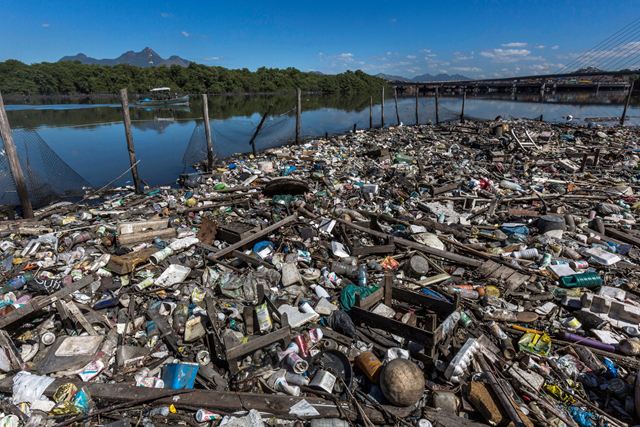Note to Olympic sailors: Don’t fall in Rio’s water – ‘It can get really disgusting, with dog carcasses in some places and the water turning brown from sewage contamination’
By SIMON ROMERO and CHRISTOPHER CLAREY
18 May 2014 RIO DE JANEIRO (The New York Times) – Nico Delle Karth, an Austrian sailor preparing for the 2016 Summer Olympics, said it was the foulest place he had ever trained. Garbage bobbed on the surface, everything from car tires to floating mattresses. The water reeked so badly of sewage that he was afraid to put his feet in it to launch his boat from shore. “I’ve never seen anything like this before,” Mr. Delle Karth said of Guanabara Bay in Rio de Janeiro, where the Olympic sailing and windsurfing events will take place. Even as Brazil scrambles to finish an array of stadiums for the start of the 2014 World Cup soccer tournament in less than a month, it is already coming under scathing criticism for its handling of the next mega-event on its plate, the 2016 Summer Games. Francesco Ricci Bitti, president of the influential association representing various Summer Olympic sports, said the Rio Games were in “the most risky position” of any Olympics he could remember. John D. Coates, an International Olympic Committee vice president, said last month that Rio’s preparations were “the worst I have experienced,” with construction yet to begin on the Deodoro sports complex, the second most important site after Olympic Park. Guanabara Bay, nestled between Sugarloaf Mountain and other granite peaks, offers the kind of a postcard image Rio’s authorities want to celebrate as hosts of the 2016 Summer Olympics. But it has become a focal point of complaints, turning Rio’s polluted waters into a symbol of frustrations with the troubled preparations for the Olympics. “Welcome to the dump that is Rio,” Germany’s sailing team said in one typically blunt assessment of the site for the Olympic regatta. Brazilians training here agree. “It can get really disgusting, with dog carcasses in some places and the water turning brown from sewage contamination,” said Thomas Low-Beer, 24, a Brazilian Olympic hopeful who sails in the bay. He shuddered when recalling how his dinghy crashed into what he believed was a partly submerged sofa, capsizing him into the murky Guanabara. Though international officials complain that Brazil has had almost five years since winning its Olympic bid to make headway, some of the delays stem from chronic problems the nation has long fought. Well-financed efforts to clean up the bay have proved disappointing for decades, undercut by mismanagement and allegations of corruption. The political rivalries among local, state and federal layers of government have led to infighting, including an impasse over who should pay for certain Olympic projects. Protests over forced evictions to make way for the Olympics have slowed construction. […] Officials vowed to tackle the problem after the United Nations Earth Summit here in 1992 drew scrutiny of Rio’s foul waters. The Rio state government secured more than $1 billion in loans from Japan’s government and the Inter-American Development Bank for cleanup projects, but they have not been even remotely successful, according to environmental experts. The State Environmental Institute in Rio de Janeiro estimates that more than 10 percent of the trash here is not collected, much of it flowing into the bay through canals and degraded rivers. Vast amounts of raw sewage leak into the waters. Officials set a goal of treating as much as 80 percent of it by the 2016 Olympics, but less than 40 percent is currently treated. State environmental officials have acknowledged they would fall short of that goal, The Associated Press reported over the weekend, citing a letter sent to federal authorities requesting more funding to battle pollution. Calling the bay “dark, brown and stinking,” Lars Grael, 50, a Brazilian sailing legend who won two Olympic medals, said he had encountered human corpses on four occasions while sailing in the bay. He told reporters that officials should move the sailing events to a resort area hours away by car. [more]
